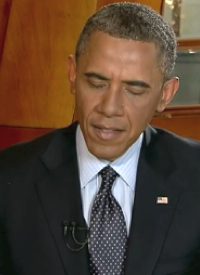
The President spent the weekend in Cartagena, Colombia to convene with Latin American political and business leaders in an effort to bolster economic ties and remind Hispanic voters back home that he supports the region. Obama affirmed that he would remain dedicated to immigration policy up until the November election, while he blamed Republicans in Congress for allegedly bringing the issue to a standstill.
The President also took an opportunity to jab at Republican presidential contender Mitt Romney, calling his political rival an extremist on immigration and warning that Romney would likely promote laws that allow for people to be stopped and forced to show citizenship papers if they are assumed illegal.
"So what we need is a change either of Congress or we need Republicans to change their mind, and I think this has to be an important debate during — throughout the country," the President averred. Obama advocates what he calls "comprehensive immigration reform," which, he claims, would ramp up border security while paving a pathway to citizenship for illegal aliens who are already residing in the United States.
Conversely, Republicans say the government should focus primarily on border protection, while encouraging immigrants to go through the legal process of receiving citizenship by not granting amnesty to individuals who have already broken the law.
"President Obama only talks about immigration reform when he's seeking votes," said Andrea Saul, a spokeswoman for the Romney campaign. "Then-candidate Obama promised to tackle immigration reform in his first year. More than three years into his term, America is still waiting for his immigration plan." Saul stressed that Obama has failed to fulfill his 2008 promise to enact immigration reform in his first year as President, asserting that he "only talks about immigration reform when he’s seeking votes."
"Mr. President, excuse the personal note, but I grew up in a generation that has lived with the unfulfilled promise of immigration reform, and I’m not that young," Acevedo noted in the interview. "And do you think if you are reelected you will be the President that gets it done? And can you promise you’ll do it within the first year of your second term?" Responded Obama:
I can promise that I will try to do it in the first year of my second term. I want to try this year. The challenge we’ve got on immigration reform is very simple. I’ve got a majority of Democrats who are prepared to vote for it, and I’ve got no Republicans who are prepared to vote for it. It’s worse than that. We now have a Republican nominee who said that the Arizona laws are a model for the country; that — and these are laws that potentially would allow someone to be stopped and picked up and asked where their citizenship papers are based on an assumption.
Acevedo also ignited a discussion about the civil rights movement and racial tensions in the United States, specifically pointing to the controversial Trayvon Martin case, which has spawned a racial war throughout the country. "Sometimes that history has been tragic, slavery, Jim Crow," the President retorted, "but also more recent examples of anti-immigrant sentiment, and you know, I think what I always tell people is that, you know, my election alone is not going to completely transform attitudes because this has to do with hearts and not just minds."
Obama acknowledged that the United States is a nation of laws, but that it is also a nation of immigrants and diversity. He went on to illustrate the "story of American progress and American strength" that stems from "connections to Colombia and Latin America and Africa and Asia."
The Hispanic voter base has undoubtedly become a critical sector of the American electorate, and Obama secured an ample majority of the Hispanic voter bloc in the 2008 election. But failure to enact so-called comprehensive immigration reform — combined with poor unemployment and a persistently stale economy — has left the President with sagging approval numbers on the part of the Hispanic community.
While Obama continues to secure higher approval ratings from Hispanics than he does from the general public, an Ipsos-Telemundo poll administered late last year showed his support among the group severely waning. A slight majority, 56 percent, said they approved of how Obama has been handling his job. His approval ratings have endured a downward trend, as 62 percent of Hispanics approved of Obama in June 2011, while a sizable 86 percent approved of his performance in April 2009.



